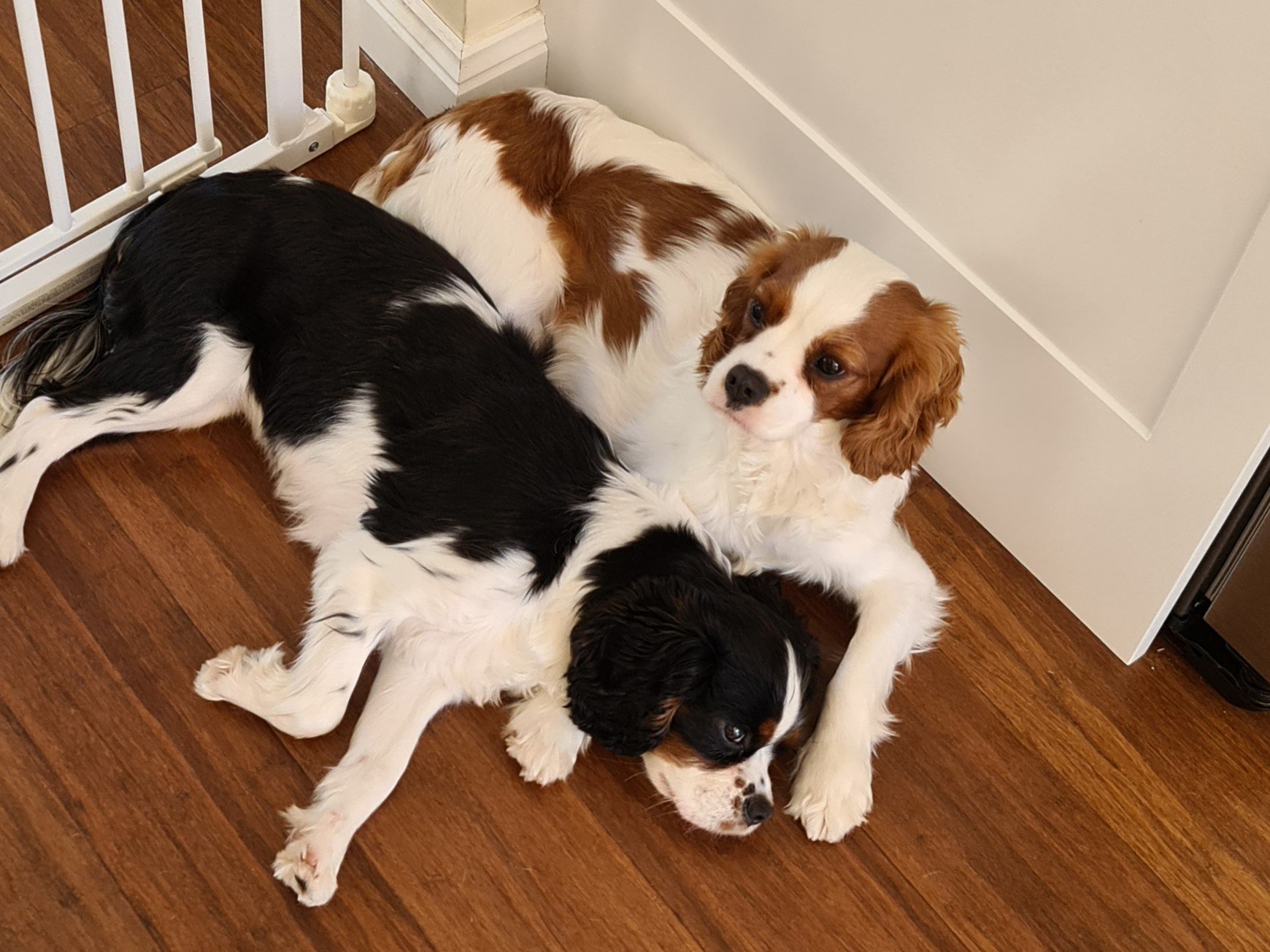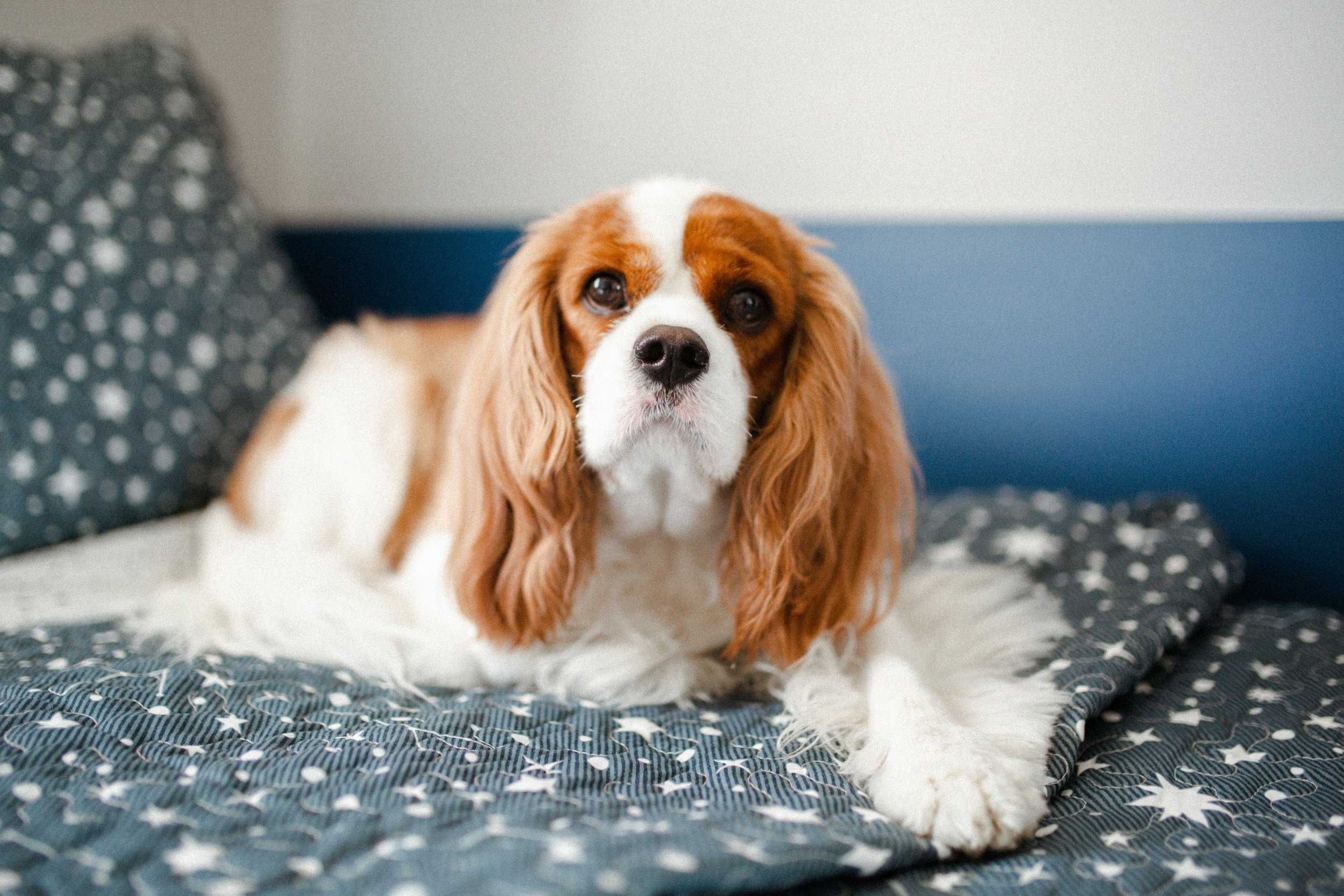
Cavalier King Charles Spaniel
The Cavalier King Charles Spaniel is a small, affectionate breed with a royal heritage. Named after King Charles II of England, who was known for his love of toy spaniels, the Cavalier was bred to be a companion dog for royalty and nobility. They are part of the toy group but retain their spaniel heritage, meaning they also enjoy moderate outdoor activities. Cavaliers are known for their expressive eyes, long, silky coats, and friendly, loving personalities, making them ideal companion dogs.
Fun Fact!
The Cavalier King Charles Spaniel has been depicted in numerous famous paintings, including works by artists like Van Dyck, as they were often seen by the sides of European royalty!
Overall
Cavalier King Charles Spaniels are affectionate, gentle, and adaptable dogs that make excellent companions for individuals, families, or seniors. They thrive on human interaction and are best suited to homes where they can receive plenty of attention and love. With the right care, they are loyal, loving pets that bring joy to any household.
Essential information
-
Qualities
Affectionate and Loyal
Cavaliers are known for their loving, gentle, and affectionate nature, making them perfect companions for families and individuals.
Adaptable
They can thrive in both apartments and larger homes, and are equally happy lounging on the couch or going for a walk.
Good with Children and Pets
Cavaliers tend to be friendly and gentle with children and other pets, making them excellent family dogs.
Low Exercise Needs
While they enjoy walks and outdoor play, Cavaliers are not overly demanding in terms of exercise and adapt well to less active households.
-
Considerations
Prone to Health Issues
The breed is prone to several genetic health problems, including heart disease (mitral valve disease), syringomyelia, and hip dysplasia, which can result in high veterinary costs.
Grooming Requirements
Cavaliers have long, silky coats that require regular brushing and occasional professional grooming to keep them free of tangles and mats.
Separation Anxiety
They are very social dogs that thrive on companionship, so they may suffer from separation anxiety if left alone for long periods.
Weight Management
Cavaliers can be prone to weight gain, careful management of their diet and exercise is important to keep them healthy.
-
Exercise & Training
Exercise Needs
Cavaliers have moderate exercise needs. Daily walks and some playtime will keep them healthy and happy. They enjoy running and playing but do not require intense physical activity.
Walks
One or two short walks per day, along with play sessions, are recommended to meet their exercise needs.
Training
Cavalier King Charles Spaniels are intelligent and eager to please, making them relatively easy to train. Positive reinforcement methods work best. They can be sensitive, so a gentle approach is key during training sessions.
-
Cost
Purchase Price
$3,000 - $6,000 AUD depending on breeder and lineage.
PuppyPal encourages you to explore rescue and shelter adoption options—these can be more affordable and offer a loving dog a much-deserved second chance at a forever home
Initial Setup
Incl. crate, bed, toys, etc
Around $400 - $600 AUD.Food
Approximately $600 - $1,500 AUD per year, depending on dietary needs.
Grooming
Professional grooming costs for Cavaliers can range from $300 - $600 AUD per year.
Vet Bills
Initial vaccinations, microchipping, and desexing can cost around $500 - $1,000 AUD. Ongoing veterinary care could cost $500 - $1,000 AUD per year.
Total Lifetime Cost
Over a 10-14 year lifespan, the total cost of ownership can range from $20,000 - $50,000 AUD, depending on health and lifestyle factors.
-
Characteristics
Size and Weight
Cavalier King Charles Spaniels typically stand 30-33 cm (12-13 inches) tall and weigh between 5-8 kg (12-18 lbs).
Coat
They have a long, silky, and soft coat that requires regular brushing to prevent tangling and matting. Their ears are also prone to mats and should be groomed frequently.
Colour Options
Cavaliers come in four recognized colour patterns: Blenheim (chestnut and white), tricolour (black, white, and tan), ruby (solid red), and black and tan.
Temperament
Cavaliers are gentle, friendly, and affectionate dogs that are known for their desire to please. They are very people-oriented and enjoy being around their families.
Good with Children
Cavaliers are generally excellent with children due to their gentle, patient nature. They tend to be tolerant and loving with kids of all ages, making them great family dogs.
Socialisation
While naturally friendly, early socialisation is still important for Cavaliers to ensure they grow up well-adjusted and comfortable around different people, pets, and environments.
-
Living Environment Suitability
Indoors vs. Outdoors
Cavaliers are best suited to indoor living with their families. They enjoy time outside for walks and play, but due to their small size and social nature, they should not be left outside for extended periods.
Apartment Living
Cavalier King Charles Spaniels are well-suited for apartment living due to their compact size and relatively low exercise needs. They are generally quiet and adapt well to smaller spaces, as long as they receive daily exercise.
Time Alone
Cavaliers thrive on companionship and can develop separation anxiety if left alone for long periods. They are best suited for homes where someone is often present, or they have another pet for company.
-
Healthcare
Common Health Issues
Cavaliers are prone to several genetic health issues, particularly mitral valve disease (a serious heart condition), syringomyelia (a neurological disorder), hip dysplasia, and eye conditions such as cataracts. Regular vet check-ups and health screenings are important to monitor for these conditions and manage their health effectively.
-
Additional info
Guarding Ability
Cavaliers are not natural guard dogs, but they may bark to alert their owners of strangers or unusual activity. They are generally friendly with most people and are not aggressive by nature.
Affectionate Nature
Cavaliers are incredibly affectionate and enjoy being close to their families. They are known for being lap dogs and will often seek out attention and cuddles from their owners.
Suitability for Dog Parks
Cavaliers are generally social and enjoy playing with other dogs. They do well in dog parks and social environments, though supervision is always recommended to ensure positive interactions.
Climate Adaptability
Cavalier King Charles Spaniels can adapt to a variety of climates, but their long coat may require extra care in hot weather. It is important to provide plenty of water and shade during warm months to prevent overheating.
Ethical Breeding Considerations
Due to the breed’s predisposition to serious health issues, it is crucial to purchase from a reputable breeder who conducts health screenings for conditions such as mitral valve disease and syringomyelia. Ethical breeding practices can help reduce the risk of hereditary health problems and improve the overall well-being of the puppies.







